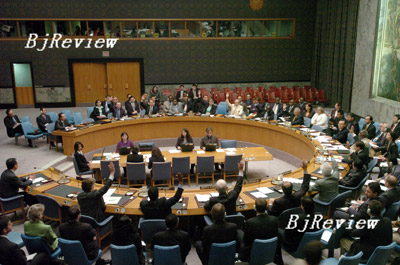
The second phase of the fifth round of the six-party talks on the North Korean nuclear issue recessed on December 22. Although there were no actual achievements, the negotiation itself was of some significance.
The talk enabled the six-party format to maintain for resolving the nuclear issue on the Korean Peninsula. Discussions had resumed after 13 months, demonstrating the possibility that the talks can go on. In addition, the validity of the Joint Statement signed on September 19, 2005, by the six parties, namely China, Japan, Russia, North Korea, South Korea and the United States, was reaffirmed. Under that accord, North Korea agreed to abandon its nuclear program in exchange for economic aid and security guarantees. The chairman's statement signed after the recent talks said the parties reiterated that they would earnestly carry out their commitments under the Joint Statement and agreed to take coordinated steps to implement the accord as soon as possible in a phased manner in line with the principle of "action for action."
Although the chairman's statement stressed the "activeness" of the talks, the tough challenges the negotiations face are still obvious.
Changed situation
The reason the negotiations were so difficult is mainly that the environment of the talks had changed.
First, the background of the negotiations was different--the previous rounds were carried out at a time when North Korea had not conducted a nuclear test. Although North Korea announced last February that it possessed nuclear weapons, the parties had some leeway in political negotiations. What the international community was more concerned about was how to meet North Korea's security needs and provide economic compensation when it abandoned its nuclear capability. But ever since North Korea conducted a nuclear test last October, the political structure of the six-party talks has greatly changed.
North Korea's missile launch in July 2006 and the following nuclear test in October prompted UN sanctions, in which the other five parties to the talks are participating, which lessened their leeway during the negotiations. In the latest talks, what the five parties focused on was how North Korea would prove its willingness to abandon its nuclear program. On this level, North Korea's nuclear test actually made its negotiating position more difficult rather than more powerful.
The second change was that North Korea's intentions became much vaguer. Before the nuclear test, abandoning its nuclear program was only a simple domestic political decision in North Korea. Now, the nuclear test demonstrated that the hardliners inside North Korea are in a leading position, and it will be more difficult for the country to abandon its nuclear program.
The country faces the dilemma of being isolated while maintaining its nuclear capability or giving up its nuclear program for peace. At the earliest stage of the six-party talks, North Korea had suggested a series of measures to be taken in steps. In this phase of the discussions, however, the country did not show any clear stance when facing U.S. proposals. It seemed that North Korea had lost its goal.
| 